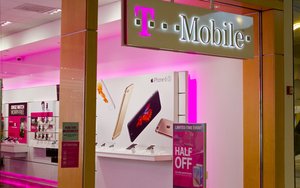 A T-Mobile ad campaign aimed at convincing customers to switch carriers by promising to "pay off" the cost of their former devices was flawed, according to a self-regulatory
group administered by the Better Business Bureau.
A T-Mobile ad campaign aimed at convincing customers to switch carriers by promising to "pay off" the cost of their former devices was flawed, according to a self-regulatory
group administered by the Better Business Bureau.
The National Advertising Review Board found that T-Mobile should have better disclosed that its promise to "pay off" the consumers' bills
meant the company would give them prepaid Visa cards and a trade-in discount on new phones, as opposed to cash reimbursements.
"It is necessary to conspicuously disclose in the body of the
advertisement -- contiguous to the 'pay off' claim -- that the pay off will be made by giving the consumer a trade-in credit and prepaid card," the appellate panel wrote in a ruling made public
Wednesday.
advertisement
advertisement
The decision stemmed from AT&T's challenge to T-Mobile's campaign, which ran on TV, billboards, and various online sites, including YouTube. Last November, the BBB-administered
National Advertising Division largely sided with AT&T and recommended that T-Mobile stop
advertising that it will "pay off" consumers' old phones.
The NAD found the promise misleading because consumers had to pay out-of-pocket to settle balances with their former carriers, even
though T-Mobile gave consumers trade-in credit and prepaid credit cards.
T-Mobile appealed that finding to the National Advertising Review Board, which largely upheld the earlier decision, but
softened it in one key respect. The earlier ruling held that the phrase "pay off" always conveyed cash reimbursements.
But a majority of the five-member appellate panel said it disagreed with
that conclusion. "A majority of the panel believes that, with appropriate explanatory language that is clearly and conspicuously disclosed in the body of the advertisement, consumers will reasonably
understand a claim that T-Mobile will 'pay off the consumer’s old phone as indicating that consumers will receive full value for the amount owed to their previous carrier through receipt of a
trade-in credit and prepaid card," the NARD wrote.
The group still found T-Mobile's ads problematic for failing to clearly disclose the details of the reimbursement.
T-Mobile said it
will take the recommendations into account when developing future ads, according to the NARD.